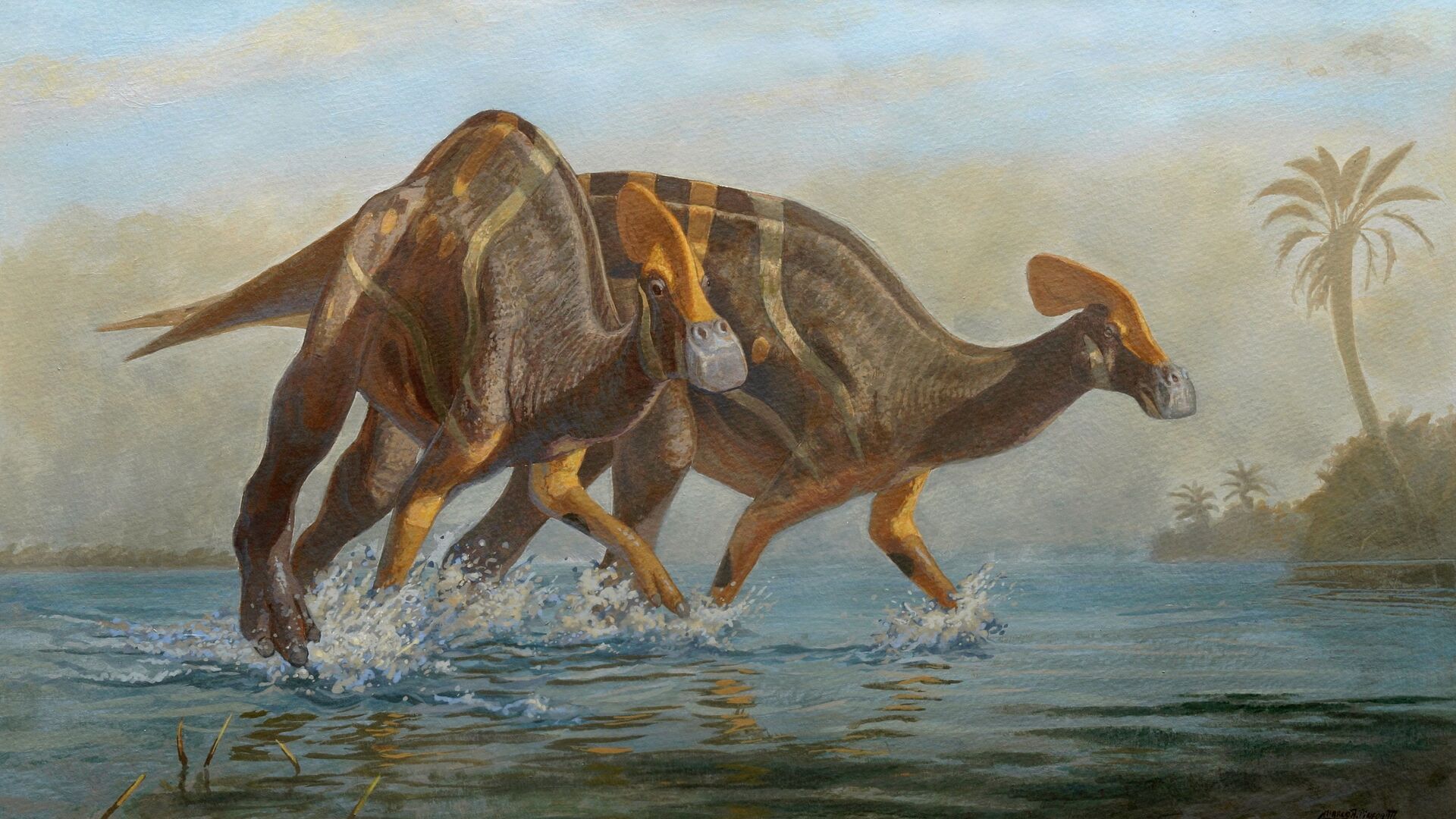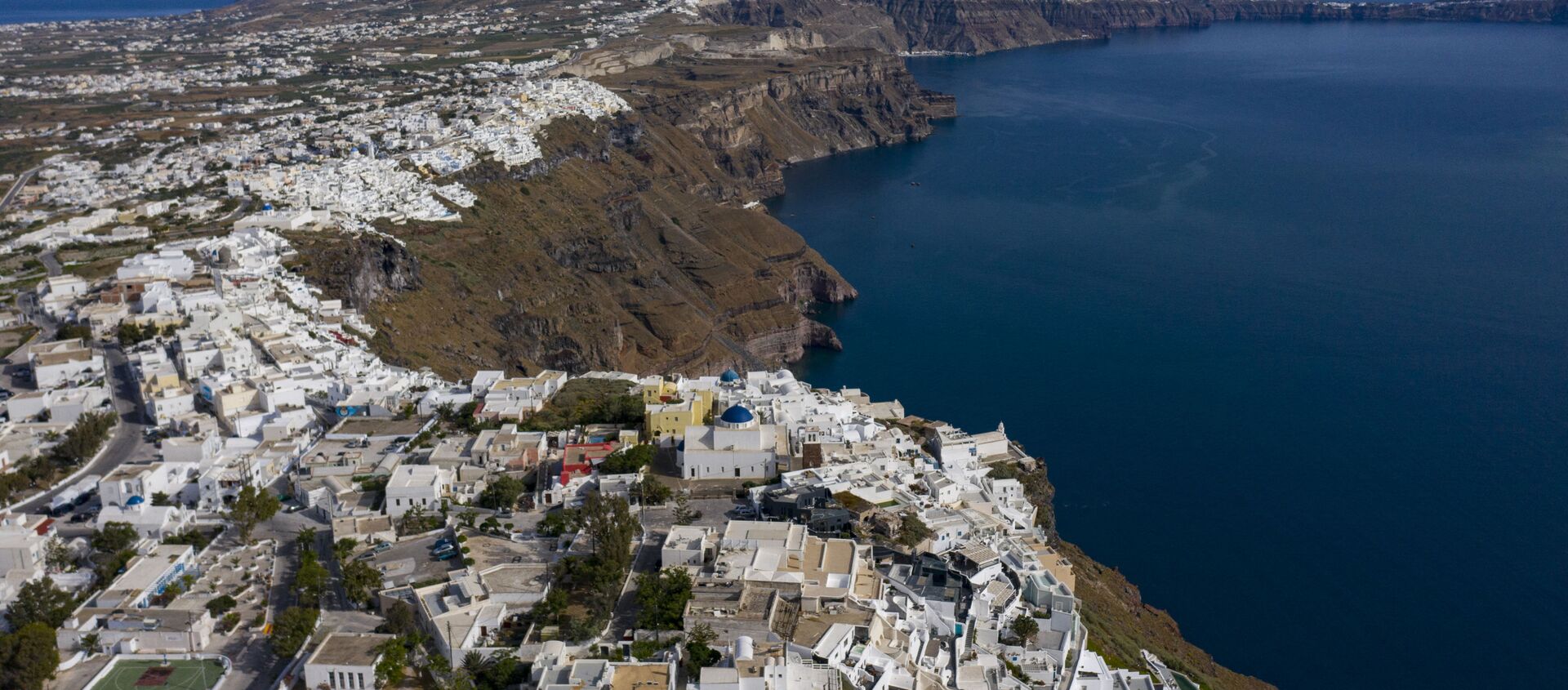https://sputnikglobe.com/20210928/volcanoes-triggered-environmental-changes-that-led-to-dinosaurs-dominance-on-earth-scientists-1089471440.html
Volcanoes Triggered Environmental Changes That Led To Dinosaurs' Dominance on Earth: Scientists
Volcanoes Triggered Environmental Changes That Led To Dinosaurs' Dominance on Earth: Scientists
Sputnik International
Scientists believe that volcanic eruptions not only permitted the rise of dinosaurs, they also established the foundation for the ecosystems of modern Earth... 28.09.2021, Sputnik International
2021-09-28T15:58+0000
2021-09-28T15:58+0000
2023-04-21T10:42+0000
volcano eruption
climate change
dinosaurs
mass extinction
earth
science & tech
https://cdn1.img.sputnikglobe.com/img/07e5/05/0e/1082891372_0:0:2756:1551_1920x0_80_0_0_a5284d2fcdff1645b680d79780bc45f0.jpg
A team of researchers, including scientists from the University of Birmingham in the UK, has uncovered the greatest evidence that the rise of dinosaurs and their eventual dominance on Earth probably happened because of volcanic eruptions.The scientists published their findings in prestigious journal, Proceedings of the National Academy of Sciences(PNAS), on Monday. The scientists studied a particular phase known as the Carnian Pluvial Episode (CPE), spanning 2 million years in the Triassic Period. This period began around 250 million years ago and witnessed the largest mass extinction event on record. According to the scientists, during the CPE - from 234 million to 232 million years ago - the temperature of Earth rose and the planet underwent a "mega-monsoon", a period of dense humidity and heavy downpour. However, the reason for this coincidence is still unclear. These ecological shifts and volcanic activities lasted a long time and the researchers believe the consequences were faced by the animals on land. Earlier studies had suggested that either volcanoes or an asteroid was responsible for dinosaurs’ abrupt extinction a million years ago. However, in 2010, it was formally declared that extinction was caused by an asteroid. The team analysed the northern China lake sediment and fossil plant records and were shocked to find that the data of four intense phases of volcanic activity matched the changes of the CPE. The scientists also found that every phase of volcanic eruption coincided with the global carbon cycle deviations, significant climatic changes, and a decrease in oxygen and animal life in the lake.“We’re often able to link volcanism to global warming, but our study is unusual in that we’ve also linked it to periods of intense rainfall. With each pulse of volcanism, we see an increase in plants adapted to wet and aquatic settings,” Hilton added.
https://sputnikglobe.com/20210803/santorini-volcano-erupts-more-often-when-sea-level-falls-study-reveals-1083514722.html
earth
Sputnik International
feedback@sputniknews.com
+74956456601
MIA „Rossiya Segodnya“
2021
Sushmita Panda
https://cdn1.img.sputnikglobe.com/img/07e5/05/12/1082926186_0:0:2048:2048_100x100_80_0_0_4474d0d7e27a36878eb8727832be74b4.jpg
Sushmita Panda
https://cdn1.img.sputnikglobe.com/img/07e5/05/12/1082926186_0:0:2048:2048_100x100_80_0_0_4474d0d7e27a36878eb8727832be74b4.jpg
News
en_EN
Sputnik International
feedback@sputniknews.com
+74956456601
MIA „Rossiya Segodnya“
Sputnik International
feedback@sputniknews.com
+74956456601
MIA „Rossiya Segodnya“
Sushmita Panda
https://cdn1.img.sputnikglobe.com/img/07e5/05/12/1082926186_0:0:2048:2048_100x100_80_0_0_4474d0d7e27a36878eb8727832be74b4.jpg
volcano eruption, climate change, dinosaurs, mass extinction, earth, science & tech
volcano eruption, climate change, dinosaurs, mass extinction, earth, science & tech
Volcanoes Triggered Environmental Changes That Led To Dinosaurs' Dominance on Earth: Scientists
15:58 GMT 28.09.2021 (Updated: 10:42 GMT 21.04.2023) Scientists believe that volcanic eruptions not only permitted the rise of dinosaurs, they also established the foundation for the ecosystems of modern Earth. The team used uranium-lead zircon dating, high-resolution chemostratigraphy, palynological and sedimentological data to investigate the correlation.
A team of researchers, including scientists from the University of Birmingham in the UK, has uncovered the greatest evidence that the rise of dinosaurs and their eventual dominance on Earth probably happened because of volcanic eruptions.
The scientists published their findings in prestigious journal, Proceedings of the
National Academy of Sciences(PNAS), on Monday. The scientists studied a particular phase known as the Carnian Pluvial Episode (CPE), spanning 2 million years in the Triassic Period. This period began around 250 million years ago and witnessed the largest mass extinction event on record. According to the scientists, during the CPE - from 234 million to 232 million years ago - the temperature of Earth rose and the planet underwent a "mega-monsoon", a period of dense humidity and heavy downpour.
The Late Triassic Carnian Pluvial Episode (CPE) saw a dramatic increase in global humidity and temperature that has been linked to the large-scale volcanism of the Wrangellia large igneous province. The climatic changes coincide with a major biological turnover on land that included the ascent of the dinosaurs and the origin of modern conifers," the study stated.
However, the reason for this coincidence is still unclear. These ecological shifts and volcanic activities lasted a long time and the researchers believe the consequences were faced by the animals on land.
“Our results show that large volcanic eruptions can occur in multiple, discrete pulses - demonstrating their powerful ability to alter the global carbon cycle, cause climate and hydrological disruption and drive evolutionary processes,” added study co-author, Dr Sarah Greene, a senior lecturer in the University of Birmingham's School of Geography, Earth and Environmental Sciences.
Earlier studies had suggested that either volcanoes or an asteroid was responsible for dinosaurs’ abrupt extinction a million years ago. However, in 2010, it was formally declared that extinction was caused by an asteroid.
The team analysed the northern China lake sediment and fossil plant records and were shocked to find that the data of four intense phases of volcanic activity matched the changes of the CPE.
“Within the space of two million years, the world’s animal and plant life underwent major changes including selective extinctions in the marine realm and diversification of plant and animal groups on land. These events coincide with a remarkable interval of intense rainfall known as the Carnian Pluvial Episode," co-author Jason Hilton, Professor of Palaeobotany and Palaeoenvironments at the University of Birmingham’s School of Geography, Earth and Environmental Sciences, said.
The scientists also found that every phase of volcanic eruption coincided with the global carbon cycle deviations, significant climatic changes, and a decrease in oxygen and animal life in the lake.
“We’re often able to link volcanism to global warming, but our study is unusual in that we’ve also linked it to periods of intense rainfall. With each pulse of volcanism, we see an increase in plants adapted to wet and aquatic settings,” Hilton added.



